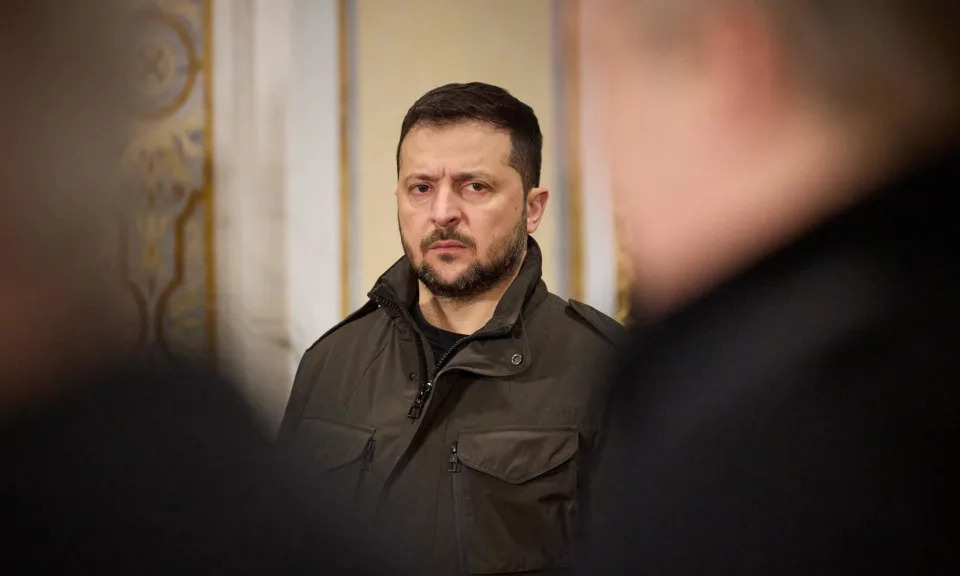The Guardian view on stalemate in Ukraine: a more realistic approach is no bad thing
Editorial
Mon, 11 December 2023

Photograph: Ukrainian Presidential Press SER/AFP/Getty Images
A year ago, Volodymyr Zelenskiy arrived in Washington as not merely the respected leader of a courageous nation, but as a global star. His address to Congress was greeted with thunderous cheers. As he returns for a third trip on Tuesday, he is seeking to win over key legislators, and the public, after Republican senators blocked $106bn in aid, primarily for Ukraine and also Israel. They have tied the spending to US immigration measures. The administration has warned that funding could run out by the end of the year. Kyiv is also trying to shore up support from its other main ally, the EU. In talks this week, Viktor Orbán, the Hungarian prime minister, is threatening to veto €50bn of support and is blocking progress on accession.
The failure of Ukraine’s counteroffensive has hit morale at home and enthusiasm for the cause abroad. Last month the commander in chief, Valerii Zaluzhnyi, acknowledged the stalemate and warned that “there will most likely be no deep and beautiful breakthrough”. This is now, more than ever, a war of attrition. Gen Zaluzhnyi’s words demonstrated not only frustration but also the growing evidence of friction between political and military leaders. The US is also more openly discussing differences, primarily over military tactics, but also over issues such as corruption.
Whether or not divisions have increased, there is more willingness to air them. In a recent Time article, a close aide complained of the president: “He deludes himself … We’re not winning.” Amid the exhaustion and despondence, ordinary Ukrainians too are beginning to question his stubborn optimism. Gen Zaluzhnyi is seen as a potential future political rival to Mr Zelenskiy; another, Vitali Klitschko, the mayor of Kyiv, has claimed that Ukraine is “sliding into authoritarianism”. Politics is no longer frozen by the conflict. Yet the grumbling should not be overstated. There is little appetite for elections in Ukraine, or for seeking a ceasefire.
For all the high-flown rhetoric heard in 2022, and while people were genuinely moved by Mr Zelenskiy’s performance and the valour – and success – of Ukrainians in fighting back, international support was never chiefly about altruistic support for a heroic nation. Those ideals shored up public support, and encouraged countries to bear the costs of backing Kyiv, but shared values coexisted with a hard-headed recognition of shared interests. The US secretary of state, Antony Blinken, was right to observe that Russia “won’t stop in Ukraine”.
Russia has no interest in a ceasefire at present. The west’s oil sanctions are no longer working. Vladimir Putin is eagerly anticipating – and, presumably, working towards – a second Trump presidency, while relishing existing signs of “Ukraine fatigue”. He can muster personnel via mobilisation – though there may be some cost if he cannot produce victories to show for many more Russian deaths.
The reality is that the enthusiasm of 2022 was never going to be maintained indefinitely. War drains not only resources but also spirits. A more realistic acknowledgment of the likely length and costs of this war, and the potential range of outcomes, was always inevitable. It should not mean abandoning Kyiv. Ukrainians must decide if and when it is time for negotiations. Right now, Ukraine needs aid, and to begin accession negotiations with the EU. A year ago, Mr Zelenskiy told Congress: “Your money is not charity. It’s an investment in … global security and democracy.” Whatever else has changed, that message stands.
No comments:
Post a Comment